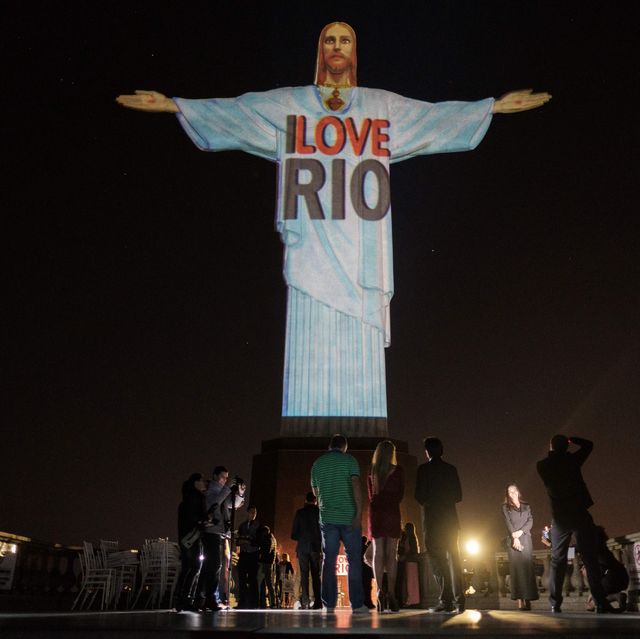A businessman, author, entrepreneur and an intellectual…but also a romantic, an idealist, a poet, and a man with vision, Riccardo Giovanni has been working for the last decade or so on bringing together the best qualities of two cities that he loves, Boston and Rio de Janeiro.
These are not two cities that you often read about in the same sentence. Though with the Olympic bid of one, the hosting of the event in the other and the rapid change of both, going forward there may be fine-tooth combing through of the traits and personalities of both cities.
Having launched Iloverio.com just before the Olympics, Riccardo celebrated the biggest website in the world about a city with the seriousness and solemnity of a Bostonian ritual. With a few key city leaders, the “I Love Rio” brand was projected onto Christ the Redeemer, the first time in the history that something like this was ever allowed.
“We didn’t want this ceremony to be a party” said Giovanni, “I think that would have been out of place for what our work is meant to achieve.”
Riccardo, who is originally from Milan, lives in Rio de Janeiro but often travels to Boston to exchange ideas and clear his mind.
“In fact, I came up with the idea for I Love Rio in Boston, in Jamaica Plain actually. I was sitting in JP Licks, in the winter of 2006, drinking hot coffee and watching the snow fall.”
Rio de Janeiro is well known for being a tourist destination, for the beaches, the nature and of course Carnival… but Riccardo wanted to show that the city and the Carioca culture is also well worth of scrutiny. Thus, he created a touristic/cultural portal explaining how all the elements that form the city came to develop and merge culturally, and offering links to hundreds of books, academic papers and scientific studies about Rio.
“Boston as a whole has an unmatched academic environment,” says Riccardo who had studied English in a summer program at Simmons, learning the language very quickly, and later graduating in Business Management and Engineering at Boston University. “You can have people sitting at the same table whose countries of origin may be at war. And yet they will be working on the same group project just fine. On the academic side, Boston has a kind of almost Utopian energy. It makes you believe world peace is possible. It is what I love the most about Beantown. It is just incredible.”
This statement may be surprising for some people who at times see a lot of division in the world, reading worrisome news day after day.
“Similarly, as a foreigner in both countries, in Rio de Janeiro I see an amazing syncretism and integrated multi-culturalism that I have only seen in few other places. For example, in Rio there are many Asians and many Italians, but there is no Chinatown or Little Italy, everyone lives together and mixes no matter where they are from. I find it so interesting.”
I asked Mr. Giovanni what he wanted to do next about this relationship between Boston and Rio.
He paused, and then almost as if he did not want to reveal his aspiration lowered his voice and shrugged, “Sister Cities? I would love to see that happen. Rio and Boston seem so different, so culturally and geographically distant, yet in their own ways they have achieved something phenomenal that the whole world really needs. To me, bringing attention to these values seem the right thing to do. Especially in our times, and it would even open new cultural and economic channels both ways.”
“Boston is probably the most important academic place in the world where people from everywhere mix and cooperate naturally under an educational umbrella. Rio, as the former capital of an empire and of a republic has been welcoming and integrating citizens of dozens of countries for over two hundred years. We can build on this. We can really build on this.”
More comfortable with talking about the idea he continued, “I brought what I learned from Boston in terms of the serious academic and business culture to Rio de Janeiro, and that was one of the keys to the success of the I Love Rio project. Are the Cariocas excited about it? Yes, very! They let me put our Symbol on their most important national icon… not much more I can add to that!”
“When I mention this idea of a sisterhood in Rio to the people and to the leaders of the city, they love it. Cariocas are very passionate people and very positive people. If you want to talk about something negative they generally will not argue with you, they will just find a polite excuse to walk away. Confrontation and criticism is not in their nature. But when you approach Cariocas with a conversation about mixing ideas and coming-up with something new, well this is how your get them interested. This is how you get their famous Brazilian smile. Bossa Nova was born this way.”
“This kind of cultural peculiarities is why I just recently developed the book ‘Think Rio,’ to help tourists understand the Carioca culture before even getting on the plane, or at least before leaving the hotel lobby. But more than that, Think Rio may be another step towards creating a new relationship between Boston and Rio de Janeiro. I have brought Boston to Rio. Now I’d like to try bringing Rio to Boston. You see, I love Rio, but I love Boston, too.”
Visit ILoveRio.com





